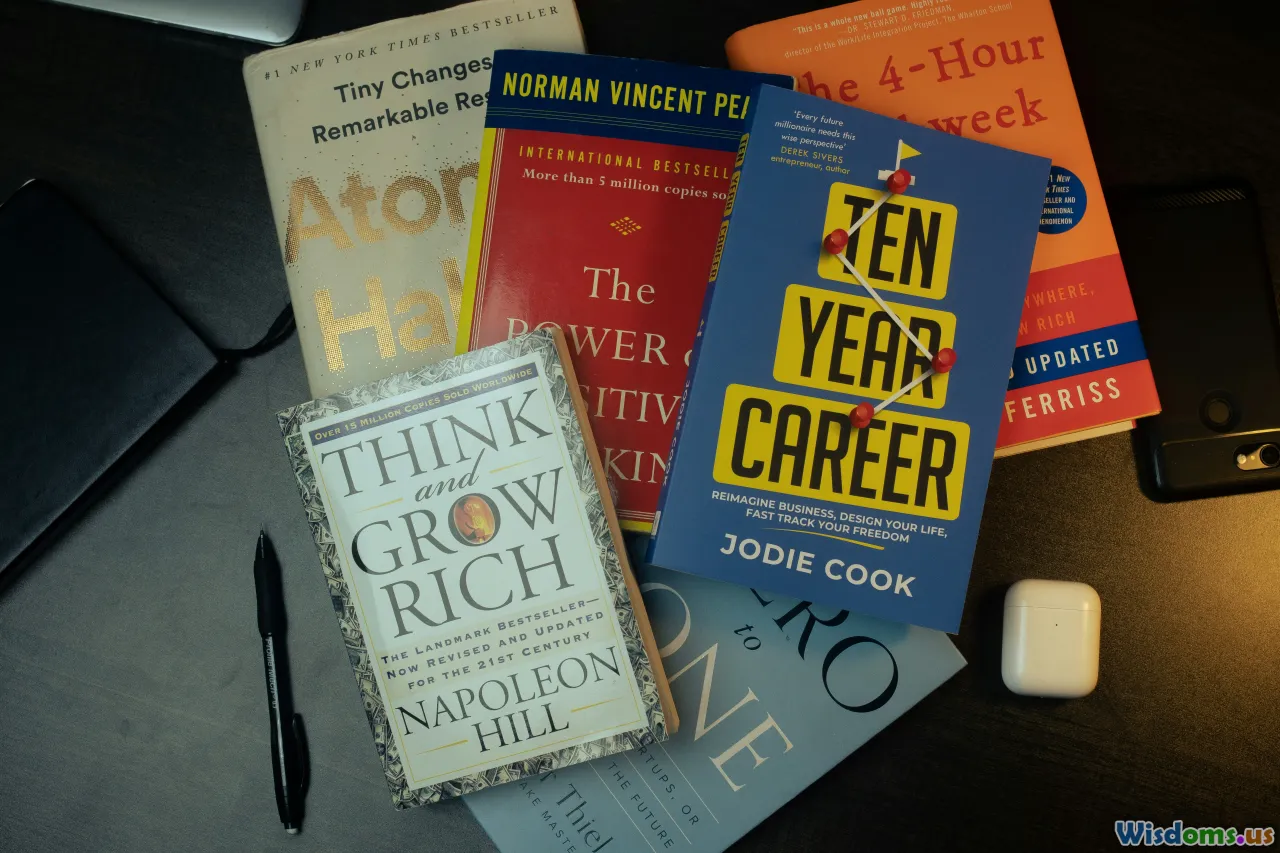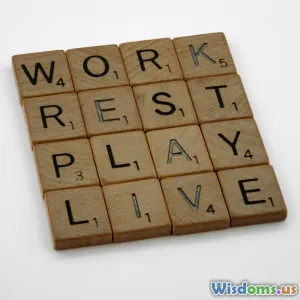
Top Career Changes That Really Improved My Health
14 min read Discover how strategic career changes can profoundly enhance well-being, reduce stress, and promote a healthier lifestyle. (0 Reviews)
Top Career Changes That Really Improved My Health
After a decade feeling chained to a desk, I started to notice chronic fatigue, back pain, and waning motivation. The link between career and health became impossible to ignore—my job wasn’t just consuming my time, it was sapping my wellbeing. So, I embarked on a quest to not only find more meaningful work, but also to reclaim my physical and mental vitality. Here, I share the career shifts that transformed my health, packed with practical tips for anyone yearning for a well-rounded life and sustainable wellness.
Trade Office Desks for Movement

Office environments are notoriously sedentary. For years, I believed productivity and sitting were synonymous—until recurring back spasms and stiff joints pushed me to rethink everything. Trading in my office chair for a role involving more movement—like field coordination and on-the-ground research—became my first move towards lasting health.
How Movement at Work Supports Wellbeing
Fact: Sitting more than eight hours a day increases your risk of chronic illnesses by 10-20%, according to a 2019 study published in the Annals of Internal Medicine. When I swapped my desk job for one that demanded light walking, stretching, and lifting, I noticed dramatic improvements: loose shoulders, diminished back aches, and afternoon energy crashes replaced with a steady, alert mindset.
Tips to Add Movement into Any Career:
- Advocate for standing desks and walking meetings.
- Integrate daily posture checks and micro-breaks using reminders or smartphone apps.
- Opt for roles that offer a natural variety, such as events manager, landscape designer, or physical therapist assistant.
Example: A friend of mine transitioned from customer service to an outdoor adventure guide. Not only did she shed weight naturally, but her mental health blossomed too, tuning her into the rhythms of daylight and fresh air—perks her cubicle never offered.
Say Goodbye to High-Stress Fields

Overblown deadlines and hostile stakeholders placed me on a fast-track to burnout. Research from the Harvard T.H. Chan School of Public Health found that stressful jobs are associated with a 50% higher risk of cardiovascular disease. Changing careers to a calmer, lower-stress field—nonprofits and education, for instance—reduced my anxiety, normalized my blood pressure, and improved my sleep.
Switch to Values-Driven Work
Instead of constantly reacting to profit-driven drama, I now work in therapeutic arts for children—a mission-led environment prioritizing emotional wellbeing. My daily stress levels are highly manageable, there’s meaningful downtime, and the work has forged new social connections unlike any I’d forged a boardroom.
Actionable Takeaways:
- Assess your workday using a stress journal; document triggers and highs/lows.
- If your role is unavoidably intense, seek internal transfers to departments famous for work-life balance or mentorship-based culture.
- Try mindfulness micro-practices before and after tense meetings: 4-7-8 breathing or quick walking meditations can rewire stress cycles.
Comparison: Industry report data from Glassdoor shows teachers and library scientists report 30% lower job-related stress compared to investment bankers and high-volume sales professionals.
Prioritize Autonomy and Scheduling Flexibility

My health improved dramatically when I took control of my own schedule by shifting to freelance consulting. Research from FlexJobs says 80% of workers believe agile scheduling would reduce their stress and promote healthier lifestyles.
The Power of Flexible Work
With a rigid 9-to-5, simple acts like a doctor’s visit or morning run became insurmountable tasks. Gaining autonomy allowed me to:
- Exercise when I had real energy—not crammed into lunch breaks.
- Prepare home-cooked meals, avoiding processed convenience foods.
- Align my most focused tasks with my natural mental peaks (8–11 am for me).
How to Harness This Benefit:
- Seek fields with a culture of output-over-hours: tech, design, writing, or consulting.
- Negotiate for core hours and async communication, not just location independence.
- Protect non-negotiables (like a hard stop time or morning self-care) to avoid old overwork habits.
Real-World Example: A designer friend moved to a commission-based remote agency. Now, he routinely surfs before work and schedules breaks for healthy snacks—something he never managed in a corporate cubicle.
Reconnect Purposefully with Nature

Repetitive Chimes and fluorescent lighting left my mind dull and my circadian rhythms in chaos. Scientists at the University of Exeter say more time in green spaces reduces risks of anxiety and heart disease. By becoming a horticultural therapy assistant, my new “office” was a greenhouse or garden path—lush settings that calmed my mind and energized my body.
Ideas for Reinventing Your Career in Nature
Not everyone can become a park ranger or farmer, but nature adjacency is possible. I’ve seen careers as outdoor educator, environmental scientist, and even mobile pet groomer transform people’s moods and immune health.
Practical Steps:
- Volunteer in local green initiatives; many learn new skills that ease the leap to an eco-focused role.
- Mix travel and work seasonally—tree planting, trail maintenance, or ecological surveying use a variety of muscles while offering fresh air year-round.
- For city dwellers, roles with hybrid outside-inside projects (urban gardening, green infrastructure planning) strike an excellent balance.
Find Work That Encourages Social Connection

A defining problem of my past desk job was isolation. The American Psychological Association notes that social connection is a significant predictor of longevity and lower inflammation markers. I shifted sectors to community arts management and found new meaning in group projects, shared goals, and open dialogue.
How Social Careers Support Health
Beyond the constant hum of collaboration, roles in teaching, coaching, or event planning create built-in support networks and foster a sense of belonging—a key pillar for mental resilience.
Actionable Insights:
- Choose environments that value cross-disciplinary teamwork; join team-building initiatives outside conventional work.
- Seek accountability partners or join professional Meetup groups aligned with your new focus.
- Practice active listening and inclusive leadership—soft skills that breed mutual trust and empathy.
How-To: Before every team meeting, I start with a short check-in (roses and thorns), building small rituals that boost camaraderie and engagement. Over time, this transformed not just my attitude at work, but also lowered my daily anxiety levels.
Transition Into Careers Promoting Lifelong Learning

Health isn’t only physical: cognitive stimulation staves off memory decline and burnout. A pivot to mentor roles or roles requiring creative problem-solving (like instructional design or research) provided me with daily intellectual enrichment. Neuroscientist Dr. Denise Park’s work shows continual learning helps build cognitive reserve, a protective buffer against aging and disease.
Strategies for Lifelong Learning at Work
- Enroll in certificates or part-time degrees relevant to a new field—online universities make this more accessible than ever.
- Seek positions embedded in R&D, innovation, or cross-training; ask interviewers about learning budgets or sabbatical policies.
- Mentor or coach others; teaching a skill to peers deepens your own understanding, giving a sense of purpose to daily routines.
Comparison: While office admin routines left me drained, daily curiosity in my role as a curriculum developer did the opposite—I felt energized, motivated to read up on new research, and less prone to mental fatigue.
Choose Roles that Align with Personal Passions and Values

Purpose is a lesser-discussed, yet crucial, determinant of health. The Blue Zones research—famous for exploring regions with the world’s longest-lived people—attributes meaning in daily work to both happiness and physical health. When my job switched from pure profit to impact-centered (notably, supporting music programs in marginalized schools), the shift was palpable: greater focus, heightened resilience to setbacks, and bountiful energy that lasted past office hours.
Tips for Fusing Purpose and Profession
- List activities and causes that hold meaning for you; cross-reference with local or remote job openings.
- Interview others who love their jobs not just for income, but for impact—they often reveal overlooked, expanding industries.
- Sample roles through volunteer gigs or gig economy projects before making a leap, so you can test alignment with your values in low-risk ways.
Insights: Pursuing mission-driven work not only heals emotional distress, but my doctor tracked an improvement in my blood pressure and quality of sleep—hard data that purpose truly pays off.
Adjust Income Expectations and Prioritize Benefits Wisely

One misconception: a hefty salary guarantees a good life. But years of battling overwork and chronic illness taught me otherwise. Aligning work with health means valuing job benefits, sabbaticals, and mental healthcare coverage just as highly as base salary.
How to Evaluate Health-Enhancing Benefits
- Research companies recognized for top wellness programs and robust parental leave.
- Calculate the cost of burnout: missed days, long-term medication, and mental health therapy frequently outweigh a modest salary bump.
- Ask honest questions during interviews about sick leave, flex options, and the culture around time-off (Is it used? Socially encouraged?).
Example: I rejected a higher-paying offer at a consulting firm that required 60-hour weeks for a public sector role with ample health insurance, a gym stipend, and counseling coverage. My out-of-pocket health costs plummeted, and my net happiness soared.
Career change isn’t a magic fix, but for me, it was the ultimate health intervention—a chance to design not just a new workflow, but a better, more vibrant self. Whether it was shifting schedules, seeking fresh air, or pursuing purpose, each career move carved a path to improved wellbeing—not only for me, but for countless others who've shared their journeys. If you’ve eyed a switch, consider your health as a guiding star. The right work doesn’t just change your life—it can literally transform your health.
Rate the Post
User Reviews
Popular Posts




















